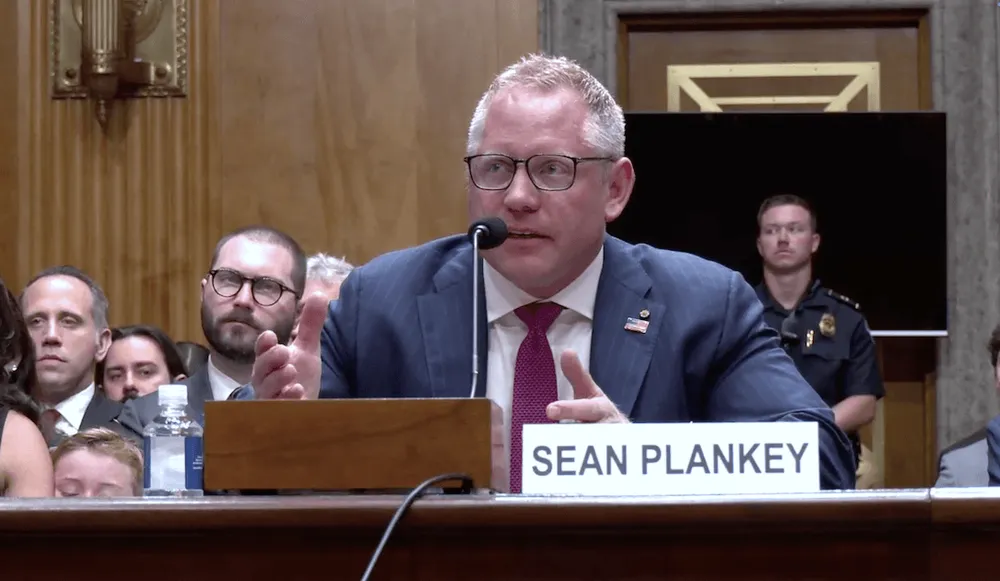After brief delay, Trump’s CISA nominee sails through Senate hearing
Sean Plankey, the nominee to run the Cybersecurity and Infrastructure Security Agency (CISA), on Tuesday received a largely warm reception from lawmakers on the Senate committee charged with advancing his nomination.
Senate Homeland Security and Governmental Affairs Committee ranking member Sen. Gary Peters (D-MI), long a champion of CISA, focused his questions on how Plankey will effectively lead an agency which he said has been “gutted” by personnel and budget cuts.
Plankey pledged to ask Department of Homeland Security (DHS) Secretary Kristi Noem for more funding if he arrives at CISA and determines a larger budget is needed to effectively steer the agency at a time when U.S. critical infrastructure is increasingly under attack from China and other threat actors.
He emphasized that he has “no doubt, if I go to [Noem] and tell her, ‘we're driving in this direction to protect the American public,’ she'll work under the president's leadership to then work with Congress to get us the funds we need.”
Plankey, who has in recent months been working as Noem’s senior adviser overseeing the Coast Guard — where he served for years, including as a cyber leader — cited a large funding increase allocated to the service in the latest Congressional budget as evidence of the secretary’s willingness to go to bat for necessary funding.
A cyber veteran who served on the National Security Council and as the Department of Energy’s senior most cybersecurity official in the first Trump administration, Plankey also signaled strong support for reauthorization of the Cybersecurity Information Sharing Act of 2015 (CISA 2015).
The law, which has broad bipartisan support, bolsters cybersecurity by allowing the private and public sectors to share information freely, in part by giving corporations liability protections.
CISA 2015 is set to expire in September and it is unclear if Congress will vote to reauthorize it before the looming deadline to do so passes, particularly given the forthcoming August recess.
Noting that Noem supports the reauthorization of CISA 2015, Plankey lamented that if it is allowed to expire, the financial sector in particular would be constrained from sharing vital information needed to protect critical infrastructure.
Plankey also said he supports CISA’s state and local grant program for cybersecurity, asserting that many Americans live in rural areas and CISA “exists to support all Americans across the United States.”
Several committee Republicans focused their questions on what they described as CISA’s censorship of conservative voices during the Biden administration.
Plankey made clear that he supports Republican efforts to move the agency away from the Biden administration's focus on policing social media companies.
“I'd seek to restore CISA to its congressional authorities and focus on the missions that you, this body, tasked it with, which is securing the federal executive branch and then securing the critical infrastructure of the United States,” Plankey said.
The hearing was not without fireworks as a handful of Democratic senators pressed Plankey to share his views on the integrity of the 2020 election.
Sen. Dick Blumenthal (D-CT) repeatedly questioned Plankey on the topic, prompting him to say he is not positioned to assess past elections.
“As a cybersecurity professional, these are state run elections,” he said. “I have not reviewed the cybersecurity posture of all 50 states.”
Answering the question, he said, would be “like a doctor who's diagnosing somebody over the television because they saw him on the news.”
Plankey’s nomination hearing had been slow to materialize. He was originally nominated to run CISA in March. A prior hearing scheduled for early June was delayed due to what the committee called a “routine paperwork issue” involving Plankey’s security clearance.
Sen. Ron Wyden (D-OR) also has placed a hold on the nomination due to CISA officials’ refusal to release an unclassified 2022 report focused on security weaknesses inside the U.S. telecommunications sector.
While a single senator cannot ultimately block a nominee whom the majority wants confirmed from receiving a vote, Wyden’s move will force the majority to use floor time to move ahead.
Plankey’s nomination has won wide praise from the cybersecurity community, including nonpartisan observers like Mark Montgomery, the former executive director of the Cyberspace Solarium Commission, who in March told Recorded Future News that Plankey has the cybersecurity chops to excel in the role of CISA director.
“Professional and competent with interagency savvy, he is just what CISA will need as we defend against an increasingly aggressive nation state adversary in China,” said Montgomery, who is now a leader at the Foundation for Defense of Democracies.
Suzanne Smalley
is a reporter covering digital privacy, surveillance technologies and cybersecurity policy for The Record. She was previously a cybersecurity reporter at CyberScoop. Earlier in her career Suzanne covered the Boston Police Department for the Boston Globe and two presidential campaign cycles for Newsweek. She lives in Washington with her husband and three children.



